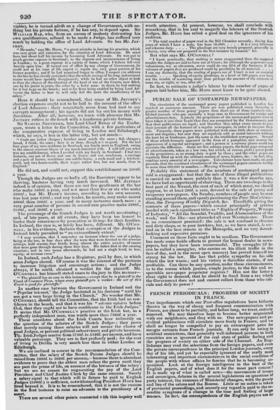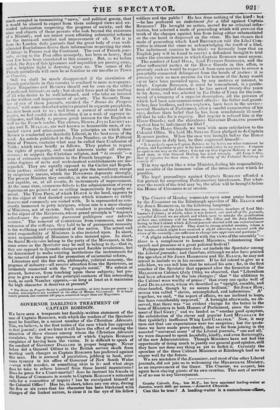FRENCH PERIODICALS; PROGRESS OF SOCIETY IN FRANCE.
THE impediments which our Post-office regulations have hitherto thrown in the way of cheap and frequent communication with France, are about to be partially, and before long, we trust, entirely removed. We may therefore hope to become better acquainted with our neighbours, and they with us. Our newspapers and pe- riodical publications will circulate more freely in France, and we shall no longer be compelled to pay an extravagant price for meagre extracts from French journals. It can only be owing to artificial restrictions, that generally well-informed persons in both countries are so ignorant of the real state of public feeling and the progress of society on either side of the Channel. An Eng- lishman may read the selections from the foreign papers, and even the private correspondence in the principal London journals, every day of his life, and yet be especially ignorant of the really most interesting and important circumstances in the social condition of the people with whose affairs he fancies that he is becoming ac- quainted. Look at the foreign intelligence in the best of the English papers, and of what does it for the most part consist? It is made up of what is called news—the movements of troops and sovereigns, debates in, the several legislatures on questions of party interest, the rumours of Ministerial changes, with the gossip and lies of the salons and the Bourse. Little or no notice is taken of provincial proceedings, and scarcely any regard is paid to the re- condite symptoms of a change in the tone and feeling of large masses. In fact, the correspondents of the English papers are so
much occupied in transmitting "news," and political gossip, that it would be absurd to expect from them enlarged views and ex- tended information respecting the progress of society, and the aims and objects of those persoes who look beyond the existence of a Ministry, and are intent noon effecting substantial reforms far the increased comfort and improvement of all. Yet it is from the London daily journals that the great body of even well- educated Englishmen derive their information respecting the state of things in France and the Continent. The cost of French jour- nals, owing to the Post-office monopoly, has been so heavy, that very few have been circulated in this country. But, as we before stated, the days of this ignorance and imposition are passing away,
and a brighter light is dawning upon us. The .sames of the French periodicals will soon be as familiar in our mouths as Times or courier.
Still we shall be much disappointed if the circulation of French periodicals in this country is confined to mere newspapers. Their Magazines and Reviews should not be seen on the tables of professed /it/era/ears only ; but should form part of the reading of all who desire to be well-informed, and who take an interest in the welfare and improvement of society.- The Seventh Num- ber of one of these journals, entitled the "Revue du Progrjs Social," with some detached articles printed in separate pamphlets, has just been sent to us ; and from a perusal of several of the papers, we feel confident in describing it as a work of superior in- telligence, and likely to possess great interest for the English as well as the French reader. The editors, Messrs. JULES LECHEVAL- LIER and E. MALLAC, are well known as honourable men, of ex- tended views and attainments. The principles on which their Review is conducted are decidedly Liberal, in the best sense of the word. An article published in the June Number, on the Political State of France, contains what may be called their Confession of Faith ; which runs briefly as follows. They profess to regard the rights of property, and vested interests under all circum- stances; to support the Christian religion, and " la morale"—a term of extensive signification in the French language. The pe- culiar dogmas of sects and ecclesiastical establishments are dis, regaided. They are equally opposed to the Carlist and Repub- lican parties; neither of which could gain the ascendancy except by sanguinary means, which the Reviewers deprecate strongly. The present Ministry they consider, in the main, well-intentioned and capable, or, at all events, fit instruments of improvement. At the same time, numerous defects in the administration of every department are pointed out as calling imperatively for speedy re- moval. The Tiers Parti, of which DUPIN is the head, appears to be the object of that decided aversion which trimmers so richly deserve and commonly are visited with. It is represented as con- stantly immersed in petty intrigues, whose aim is a mere change of Ministers, not of system. Such conduct is precisely contrary to the object of the Reviewers, whose grand principle is" toujours subordonner les questions purement politiques aux interi'ts sociaux." The removal of restrictions from commerce, and the extension of the suffrage, they hold to be of paramount necessity to the wellbeing and contentment of the nation. The actual and strict responsibility of Ministers is also insisted upon. In short, strict responsibility of Ministers is also insisted upon. In short, the Social Reviewers belong to the party of the Movement, in the same sense as the Spectator may be said to belong to it,—that is, they are opposed to dynastic changes and forcible revolutions, but are determined to make existing institutions the instruments for the removal of abuses and the promotion of substantial reform, Literature and the fine arts, philosophy, political economy, the progress of industry—all receive attention from the Reviewers, as intimately connected with the " progres social." We refrain at present, however, from touching upon these subjects; but pro- pose to give a resume of the principal contents of this interesting work, as each Number appears,—so long at least as it maintains the high character it deserves at present.* • The &rue du Progres Social is published monthly, at forty francs per annum : in London, subscriptions are received at the office of Messrs. GALIGNANI. It is baud. iumely printed, and contains 140 pagcs, somewhat larger than our Magazines.























 Previous page
Previous page